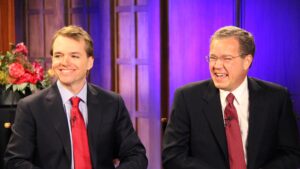Navigating the Future of Berkshire Hathaway: What Warren Buffett’s Departure Means for Investors
As the investment world processes the imminent exit of Warren Buffett, the billionaire icon behind Berkshire Hathaway, a pivotal question looms: Who will manage Berkshire’s staggering $275 billion stock portfolio? With Buffett stepping down as CEO at the end of 2025 after a remarkable 60-year tenure, many investors are keenly analyzing the future leadership and investment strategy of this colossal conglomerate.
The Transition of Power: Who’s in Charge?
At 94, Buffett will remain as chairman of the board, but the handover to Greg Abel, 62, the current vice chairman of non-insurance operations, is poised to redefine the company. While Abel’s expertise lies in operational prowess and strategic deal-making, concerns grow around his experience in stock selection. David Kass, a long-time Berkshire shareholder and finance professor, has voiced apprehension, stating, "As CEO, Greg’s primary role will be to allocate capital. He will be deciding on acquisitions, but I do not believe he will be picking stocks."
What does this mean for investors? It emphasizes the need for a clear investment strategy that bridges the gap between operational leadership and investment acumen.
The Role of Buffett’s Lieutenants
Berkshire’s investment landscape also hinges on the influence of Todd Combs and Ted Weschler, Buffett’s two investment lieutenants. Each has managed about $15 billion over the past decade, but their recent performance has remained a topic of speculation. Tightly tied to their compensation are metrics based on their excess returns over the S&P 500.
Some analysts suggest these hedge fund veterans might be given an expanded role in steering Berkshire’s stock portfolio. Given their past successes—Weschler notably amplified his retirement account from $70,000 to over $260 million—it’s conceivable they could play a crucial part in navigating the company’s investment future.
Possible Changes on the Horizon
Catherine Seifert, an analyst at CFRA, has mooted the idea of creating a chief investment officer position to synthesize the investment strategy under one umbrella, potentially naming Weschler for the role. This could provide the much-needed clarity on managing Berkshire’s sizeable investments.
Weschler and Combs have supported deal closures, with Combs also overseeing Geico, one of Berkshire’s crown jewels. Yet, their opaque track record has raised questions, especially as they appeared to lag behind both Buffett and the broader U.S. stock market.
Abel’s Commitment to Value Investing
Despite uncertainty, Abel reassures shareholders of his commitment to Buffett’s patient value-investing philosophy. With $347 billion in cash reserves, he stands ready to act on lucrative opportunities, emphasizing, "If you understand businesses, you’ll understand common stocks." His operational expertise could be invaluable, but the investment community is eager to see how he juxtaposes this with sound stock-picking principles.
What’s Next for Investors?
As we stand on the brink of this monumental leadership shift, investors should remain alert and prepared. The landscape will likely change, and understanding the new hierarchy and investment strategies will be crucial for making informed decisions.
At Extreme Investor Network, we’re committed to bringing you the latest insights and analyses to help navigate these transitional waters confidently. Stay tuned to our blog for ongoing updates on Berkshire Hathaway and other big players in the investment realm. Understanding these shifts will position you ahead in the ever-evolving world of stocks and investments.

